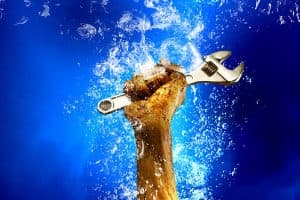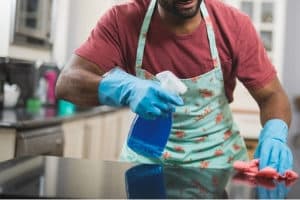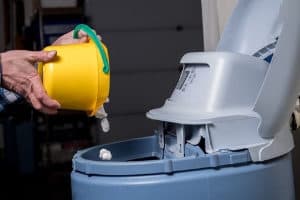Hard water is proven to reduce the life span of plumbing systems and continuously contributes to problems such as rust. Many plumbing industries know the secret to cleaning and avoiding hard water stains and damages, but they rarely inform their clients of the secret.
At Gene Johnson Plumbing and Heating, we’re not those kinds of people. We’re so confident in our services and advice, that we’re going to let you in on the secret all plumbing companies try to keep to themselves about hard water and water softeners.
The Hard Truth About Hard Water

While it’s generally safe for your body, it’s the plumbing components and surrounding surfaces that encounter the most trouble. Pipes, dishwashers, and faucets are typical victims of hard water damage and stains, as well as surfaces like glass, marble, and porcelain.
Hard water deposits are alkaline, so an acid-based cleaner is usually the best way to clean them, but that isn’t always the case. Some surfaces require a gentler touch and some plumbing components require a little more.
Cleaning Stains on Different Surfaces

Vinegar and salt water are both effective for cleaning stain such as hard water, plus you don’t have to worry about acidic toxicity. For added convenience when cleaning shower tiles, once the vinegar solution is applied take a normal shower instead of scrubbing and rinsing.
To avoid damaging surfaces made of porcelain, such as toilets, consider using a powdered all-purpose cleaner and a fine-grit drywall sanding screen. Cleaning stains on marble also require a softer touch with mild soap and a soft towel or fine steel wool. Water spots may also live on your car if it’s parked near water sprinklers.
A normal wash then a mixed solution of one-part vinegar and one-part soft water (distilled) will help remove hard water spots. We have tons of solutions and advice when it comes to cleaning stains such as hard water, but how can you prevent them from reappearing?
A Water Softener Can Save Your Plumbing

For more modern homes, a high-quality water softener is a necessity. When a trained technician at Gene Johnson Plumbing installs a water softener, it will begin removing the magnesium and calcium buildup at the source.
While hard water stains are hard on the body, it’s also hard on your plumbing. Mineral deposits can clog the drains and pipes and cause appliances such as water heaters and washing machines to wear out sooner than expected. A water softener can solve your hard water problems and provide a solution for preventing future stains and plumbing emergencies.
If you’re tired of looking at hard water stains on seemingly every surface of your home, it’s time to make a change. Once you notice hard water stains in your home, you’ll find signs in every home you visit. Help your neighbors and friends find a real solution to hard water problems by sharing this article. Our trained technicians at Gene Johnson Plumbing can help residents of Seattle, WA by offering water softener installation and service! Call us today!





